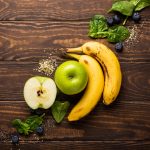Discover these top prebiotics and what they can do for your health
 (NaturalHealth365) Eating healthy foods can prevent early death and reduce the incidence of chronic disease – a fact most of us can easily get behind. But given all the marketing and nutrition philosophies out there – from the vegan diet to the keto diet -what’s less clear is which “healthy foods” should make it onto our weekly grocery list.
(NaturalHealth365) Eating healthy foods can prevent early death and reduce the incidence of chronic disease – a fact most of us can easily get behind. But given all the marketing and nutrition philosophies out there – from the vegan diet to the keto diet -what’s less clear is which “healthy foods” should make it onto our weekly grocery list.
One clear winner that happens to fit into many dietary styles: prebiotics. Time to discover why this group of foods is so beneficial for your health.
8 impressive health benefits of including prebiotics in your diet
Prebiotics were first defined in the literature in 1995. In a 2018 review published in Current Developments in Nutrition, a group of authors offered this definition for prebiotics: “a non-digestible compound that, through its metabolization by microorganisms in the gut, modulates composition and/or activity of the gut microbiota, thus conferring a beneficial physiologic effect on the host.”
In other words:
Prebiotics are high-fiber foods that feed your friendly gut bacteria (microbiota), which benefits your gut health and you! Note the difference in probiotics, which are foods and supplements containing live microorganisms that also support friendly gut bacteria. (Examples of probiotic foods and beverages include kombucha, kefir, tempeh, kimchi, and sauerkraut.)
Here are 8 science-supported ways that prebiotic foods can help:
- Increases the amounts of healthy bacteria in the gut, including Bifidobacteria and Lactobacilli
- Decreases the amount of pathogenic or “bad” bacteria in the gut
- Increases the production of beneficial “metabolites” by gut bacteria, which are compounds that are involved in important processes like cell-to-cell communication, metabolism, and immunity
- Increases the absorption of calcium
- Decreases fermentation of protein, which could otherwise lead to the accumulation of potentially harmful metabolites like ammonia, amines, and sulfides
- Decreases the risk of allergy
- Improves immune function
- Reducing gut barrier permeability and inflammation (hallmarks of “leaky gut”)
Your prebiotics grocery list: Add these healthy foods to your gut-friendly diet
According to various research studies, the following healthy foods offer some of the greatest prebiotic potential. You might already be eating more prebiotics than you realize!
- Whole grains
- Apples
- Bananas
- Dandelion greens
- Jicama root
- Garlic
- Onions
- Artichokes
- Seaweed
- Flaxseed
To give a few examples, barley and oats contain a prebiotic fiber called beta-glucan. Beta-glucan is shown to support healthy cholesterol and blood sugar levels. Wheat bran contains a type of prebiotic fiber called arabinoxylan oligosaccharides (AXOS) that help healthy Bifidobacteria thrive. Prebiotics found in flaxseed and bananas may help reduce bloating. Apples contain a compound called pectin that increases the production of a short-chain fatty acid called butyrate that improves gut bacteria balance.
By the way, these foods contain other nutrients, too – including vitamins, minerals, proteins, and essential fatty acids that are great for your overall health. Many of these foods, including garlic, even demonstrate potential anticancer, antioxidant, and anti-inflammatory properties.
Consider enjoying these foods raw or lightly cooked to minimize any damage to their prebiotic nutrients.
The bottom line: Prebiotic foods fuel you – but they fuel your gut bacteria, too. Incorporate prebiotics into your daily diet to help reduce your risk of chronic disease, ease symptoms like bloating, and improve your overall wellbeing.
Sources for this article include:
Harvard.edu
NIH.gov
MayoClinic.org
NIH.gov
NIH.gov
ScienceDirect.com



